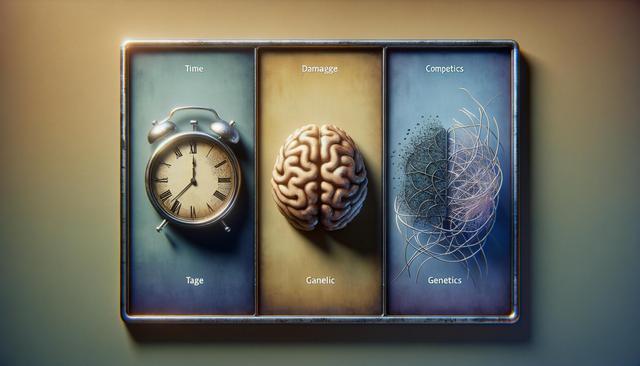Alzheimer’s Disease and Its Role in Dementia
Alzheimer’s disease is widely recognized as the most common cause of dementia, accounting for a large proportion of cases globally. It is a progressive neurological disorder that leads to the degeneration and death of brain cells, resulting in a steady decline in memory, reasoning, and other cognitive functions. Early signs often include forgetfulness, confusion, and difficulty with language, which gradually worsen over time. The accumulation of abnormal protein deposits in the brain, such as amyloid plaques and tau tangles, disrupts communication between neurons and contributes to brain tissue loss. While the exact cause of Alzheimer’s is still not fully understood, researchers believe it arises from a combination of genetic, environmental, and lifestyle factors. Age is the most significant risk factor, but family history and certain gene variants can also increase susceptibility.
Genetic Factors and Hereditary Risks
Genetics play a crucial role in determining an individual’s risk of developing dementia. While most cases are considered sporadic, meaning they occur without a clear family history, some forms of dementia are inherited. For instance, early-onset familial Alzheimer’s disease is a rare inherited form that usually affects individuals before the age of 65. Certain gene mutations, such as those in the APP, PSEN1, and PSEN2 genes, have been linked to this form of dementia. In more common cases, the presence of the APOE-e4 gene variant is associated with a higher risk of late-onset Alzheimer’s disease. However, having this gene does not guarantee that a person will develop dementia; it only increases the likelihood. Genetic counseling and testing may be helpful for individuals with a strong family history of dementia, especially if symptoms appear at a younger age.
Lifestyle and Environmental Influences
Lifestyle choices and environmental exposures can significantly affect brain health and the risk of developing dementia. Factors such as physical inactivity, poor diet, smoking, excessive alcohol consumption, and lack of mental stimulation have all been associated with an increased risk of cognitive decline. On the other hand, adopting healthy habits may help protect brain function and delay the onset of symptoms. Beneficial lifestyle practices include:
- Regular physical exercise
- A diet rich in fruits, vegetables, whole grains, and healthy fats
- Engaging in mentally stimulating activities
- Social interaction and community involvement
- Quality sleep and effective stress management
Environmental factors such as exposure to air pollution and heavy metals may also play a role in increasing dementia risk, although more research is needed to fully understand these connections.
Medical Conditions That Contribute to Cognitive Decline
Several medical conditions are known to increase the risk of dementia by affecting brain health, either directly or indirectly. Cardiovascular diseases, including hypertension, stroke, and heart disease, can impair blood flow to the brain and lead to vascular dementia. Diabetes, particularly when poorly managed, may also increase dementia risk through mechanisms such as chronic inflammation and damage to blood vessels. Additionally, conditions like Parkinson’s disease, Huntington’s disease, and multiple sclerosis can cause forms of dementia linked to their specific neurological effects. Other contributing factors include:
- Chronic kidney or liver disease
- Sleep disorders such as sleep apnea
- Severe head injury or repeated concussions
- Untreated depression or other psychiatric conditions
Identifying and managing these health issues early can be an important step in preventing or slowing the progression of cognitive impairment.
Impact of Aging and the Importance of Early Detection
Aging is the most significant risk factor for dementia, with prevalence increasing significantly in individuals over the age of 65. As the population continues to age globally, the number of people affected by dementia is expected to rise. However, dementia is not a normal part of aging, and many older adults maintain sharp cognitive function well into later life. Recognizing early signs and seeking medical evaluation can lead to timelier diagnosis and better management of symptoms. Symptoms to watch for include:
- Persistent memory loss that disrupts daily life
- Difficulty completing familiar tasks
- Confusion with time or place
- Problems with words in speaking or writing
- Withdrawal from social activities
Early detection allows individuals and families to plan for care, explore treatment options, and make lifestyle adjustments that may help preserve cognitive function for as long as possible.
Conclusion: Supporting Brain Health Through Awareness and Action
Understanding the major causes of dementia highlights the importance of a proactive approach to cognitive health. While Alzheimer’s disease remains the leading cause, a wide range of genetic, lifestyle, and medical factors also contribute to the likelihood of developing dementia. By recognizing these influences, individuals can make informed choices to support their brain health, such as maintaining a healthy lifestyle, managing chronic conditions, and staying socially and mentally active. Early detection and intervention are key to improving quality of life and planning for the future. As research continues to uncover more about dementia, increased awareness and education will remain essential in addressing this complex and growing public health issue.


